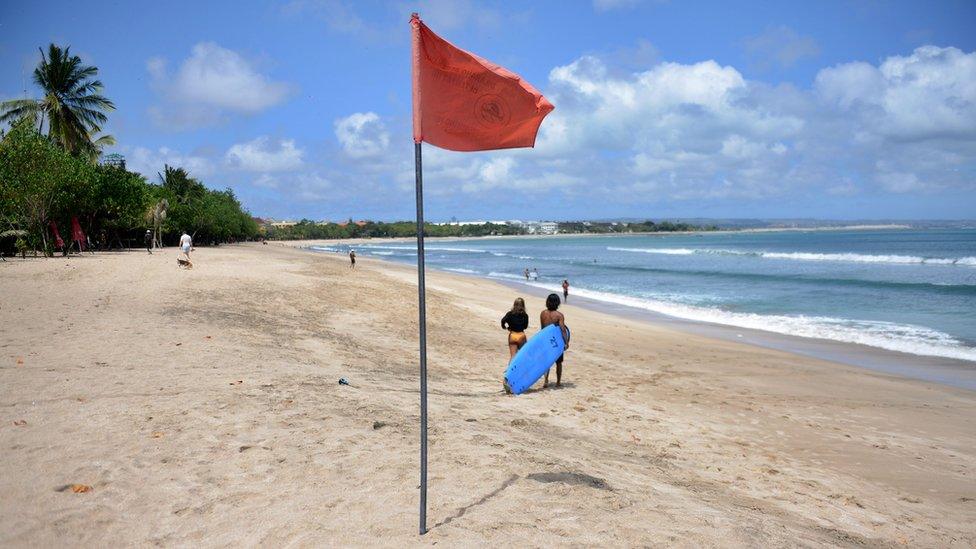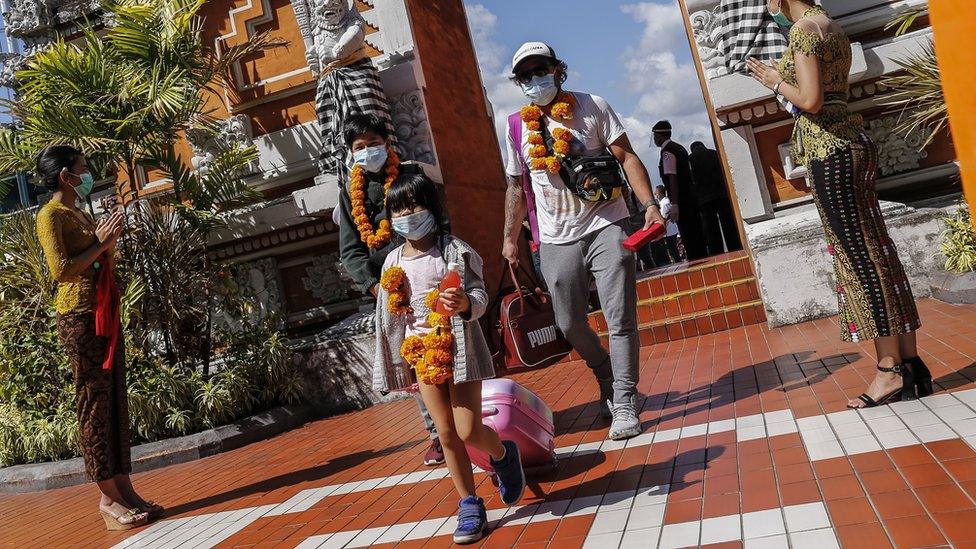Coronavirus: Bali closed to foreign tourists until end of 2020
- Published

The Indonesian island of Bali will not open to foreign tourists again this year, due to coronavirus concerns.
Authorities of the popular holiday destination had earlier said foreign visitors would be allowed to return from next month.
But the plan has been scrapped over concerns about Indonesia's mounting Covid-19 cases.
The move has renewed worries about the impact on residents in an economy heavily dependent on tourism.
Millions of foreigners fly to Bali each year in search of deserted beaches, terraced rice fields and sprawling Hindu temples.
But their numbers have dropped sharply since Indonesia closed its borders to non-residents, like other countries battling with the pandemic.
Since the end of July the island has turned to domestic visitors to help its ravaged tourism industry, the heart of the local economy, reopening beaches, temples and other landmarks to local travellers.
But hotels and restaurants have been struggling to survive, with many resort workers returning home to villages and small towns to earn an income.
"The situation in Indonesia is not conducive to allow international tourists to visit the country, including Bali," said the island's governor, Wayan Koster, in a recent statement.

The statement did not specify when Bali would reopen to foreign travellers but said Indonesia would not be open to international tourists "until end of 2020".
The governor said reopening would require "prudency" and careful preparation, because failure could damage the island's recovery and reputation.
Bali had reported 4,576 coronavirus infections and 52 deaths as of Monday.
Nationwide, Indonesia has reported more than 155,000 coronavirus infections and at least 6,759 deaths - the highest number of fatalities in South East Asia. Experts believe the numbers would be higher if there was more testing.

'First passenger in five months'
Resty Woro Yuniar, BBC News, Jakarta
The decision by Bali's governor is the latest blow to millions of Balinese, whose livelihood has been battered by the pandemic since March.
Tourism contributes about 80% to the province's economy. More than six million foreigners visited the island last year.
On a recent vacation to Bali, I saw firsthand the economic downturn. Kadek, a cheerful rental car driver who picked me up from the airport, told me I was his "first passenger in five months".
Many shops, bars, restaurants, and hotels are closed, including the ones in popular tourist areas of Seminyak and Kuta, which normally bustle with Australian, British, and European tourists in summer months like August.
Diving shops and yoga studios are also largely closed or empty, as well as fancy resorts alongside Nusa Dua beach.
Tour guide I Made Subrana told me: "I'm very concerned about this, international tourism has been the locomotive of Balinese economy. My income has declined because of the pandemic. Usually this is 'European season', from May till October."

Tourism hit hard
I Putu Gede Budiarta, general manager of a hotel in the city of Denpasar, Bali's capital, said the coronavirus outbreak and travel restrictions were having a "serious impact" on the tourism sector.
"Most of us work in hospitality and most of our travellers come from abroad. It's a difficult time, it is affecting incomes," he told the BBC.

HOW A VIRUS SPREADS: An explanation

The hotel where he works is less than half full as it tries to attract domestic travellers. But a separate guesthouse the manager runs in the countryside has stood empty for months.
In March hundreds of British tourists reported being stranded on Bali by a rush to book flights home, as the UK government urged nationals to return and countries worldwide went into lockdown.
Activity has slowed down on the Facebook groups that arose to help travellers swap information on flights but tourists still share details, reporting it is easier to fly home on flights via the capital, Jakarta.